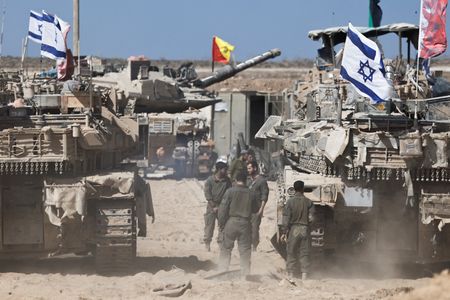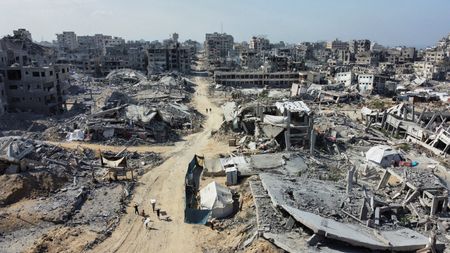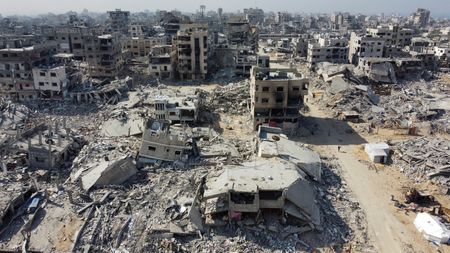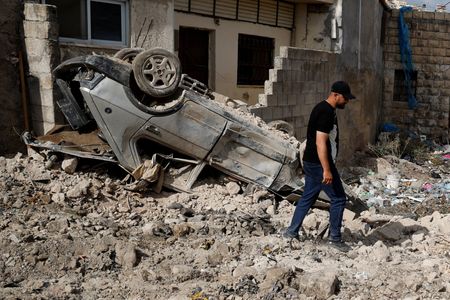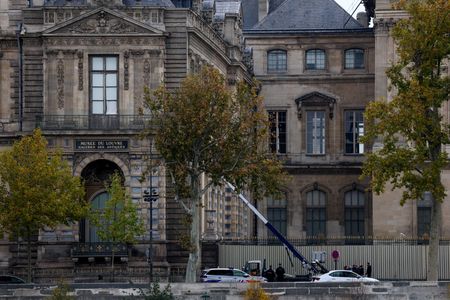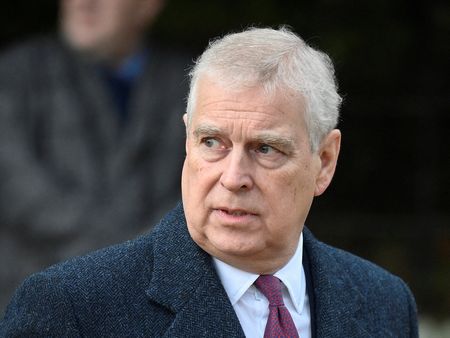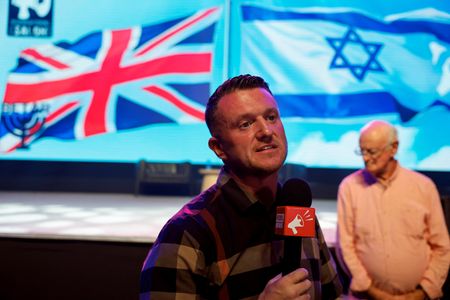JERUSALEM/CAIRO (Reuters) -The Israeli military said it launched air strikes and artillery fire at targets in southern Gaza on Sunday, dimming hopes that a U.S.-mediated ceasefire would lead to lasting peace as Israel traded blame with Palestinian militant group Hamas.
Israel’s attacks on Sunday were the most serious test of an already fragile ceasefire, which took effect on October 11.
Israel’s military said in a statement that the strikes targeted militants in the Rafah area who had opened fire on its soldiers. It said the attacks destroyed tunnels and military buildings.
Israeli Prime Minister Benjamin Netanyahu said Israel would retaliate forcefully to Hamas attacks on its soldiers.
Hamas’ armed wing said in a statement that it remained committed to the ceasefire agreement in all of Gaza, adding that it was unaware of clashes in Rafah and that it has not been in contact with groups there since March.
“We affirm our full commitment to implementing all agreements, foremost among them the ceasefire across all areas of the Gaza Strip,” the Al-Qassam Brigades said.
Palestinian witnesses on Sunday separately told Reuters of explosions and gunfire in Rafah, tank fire in the southern town of Abassan near Khan Younis, an airstrike in the central town of Zawayda and explosions in the central town of Deir Al-Balah, which killed at least five people, according to medics at Al-Aqsa Hospital.
Witnesses in Khan Younis heard a wave of airstrikes launched into Rafah early on Sunday afternoon.
ISRAELI FIRE KILLS AT LEAST EIGHT IN GAZA, HEALTH MINISTRY SAYS
Gaza’s health ministry said on Sunday that Israeli attacks had killed at least eight people in the last 24 hours.
An Israeli military official said earlier on Sunday that Hamas had carried out multiple attacks against Israeli forces inside Gaza, including a rocket-propelled grenade attack and a sniper attack against Israeli soldiers.
“Both of the incidents happened in an Israeli-controlled area…This is a bold violation of the ceasefire,” the official said.
Defense Minister Israel Katz said the “yellow line” to where Israeli forces had pulled back under the ceasefire agreement would be physically marked and that any violation of the ceasefire or attempt to cross the line would be met with fire.
Senior Hamas official Izzat Al Risheq said on Sunday that the Palestinian militant group remained committed to the ceasefire, which he accused Israel of repeatedly violating.
The government media office in Gaza said on Saturday that Israel had committed 47 violations after the ceasefire deal, leaving 38 dead and 143 wounded.
“These violations have ranged from direct shooting at civilians, to deliberate shelling and targeting operations, as well as the arrest of several civilians,” the media office statement said.
RAFAH CROSSING TO REMAIN CLOSED
The Israeli government and Hamas have been accusing each other of violations of the ceasefire for days, with Israel saying the Rafah border crossing between Gaza and Egypt will remain closed until further notice.
Rafah has largely been shut since May 2024. The ceasefire deal also includes the ramping up of aid to Gaza, where hundreds of thousands of people were determined in August to be affected by famine, according to the IPC global hunger monitor.
The crossing has in previous ceasefires functioned as a key conduit for humanitarian aid to flow into the enclave.
Israel and Hamas have been engaged in a dispute over the return of the bodies of deceased hostages. Israel demanded that Hamas fulfill its obligations in turning over the remaining bodies of all 28 hostages.
Hamas has returned all 20 live hostages and 12 of the deceased and has said it has no interest in keeping the bodies of remaining hostages. The group said the process needs effort and special equipment to recover corpses buried under rubble.
Formidable obstacles to Trump’s plan to end the war still remain. Key questions of Hamas disarming, the future governance of Gaza, the make-up of an international “stabilization force”, and moves towards the creation of a Palestinian state have yet to be resolved.
The U.S. State Department did not immediately respond to a request for comment.
Renewed fighting in Gaza and concerns over the ceasefire pushed key Tel Aviv share indices down nearly 2% on Sunday.
(Reporting by Nidal Al-Mughrabi, Maayan Lubell, Jaidaa Taha, Muhammad Al Gebaly, Alexander Cornwell and Steven Scheer; Writing by Andrew Mills; Editing by Sharon Singleton)

